Top 10 Foods Highest in Leucine
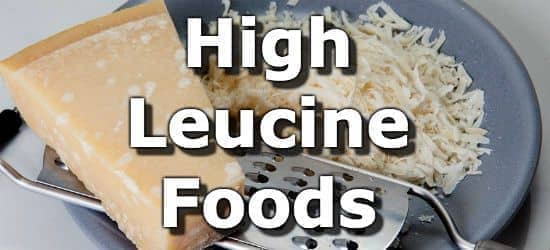
Leucine is an essential, branched-chain amino acid (BCAA), required for the growth and repair of muscle, skin and bone. Leucine is suspected to be the only amino acid that can stimulate muscle growth and help prevent the deterioration of muscle with age.
High leucine foods include chicken, beef, pork, fish (tuna), tofu, canned beans, milk, cheese, squash seeds, and eggs. The reference dietary intake (RDI) for leucine is 39mg per kilogram of body weight, or 17.7mg per pound. A person weighing 70kg (~154 pounds) should consume around 2730mg of leucine per day.
Below is a list of the top 10 foods highest in leucine with the %RDI calculated for someone weighting 70kg (154lbs). For more high leucine foods see the extended list of leucine-rich foods.
List of High Leucine Foods
 1 Chicken Leg
1 Chicken Leg| Leucine per Roasted Leg (Thigh And Leg) | Leucine per 100g | Leucine per 200 Calories |
|---|---|---|
| 5160mg (189% RDI) | 2000mg (73% RDI) | 2174mg (80% RDI) |
More Poultry High in Leucine
- 165% RDI per 6oz roasted chicken breast
- 163% RDI per 6oz of lean ground turkey
- 116% RDI per 6oz of roasted turkey breast
See all meats high in leucine.
 2 Beef (Skirt Steak)
2 Beef (Skirt Steak)| Leucine per 6oz Steak | Leucine per 100g | Leucine per 200 Calories |
|---|---|---|
| 5007mg (183% RDI) | 2945mg (108% RDI) | 2198mg (81% RDI) |
More Red Meat High in Leucine
- 85% RDI in 3oz of lamb roast
- 84% RDI per 3oz of beef roast
- 62% DV per 3oz beef hamburger
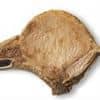 3 Pork Chops
3 Pork Chops| Leucine in 1 Pork Chop | Leucine per 100g | Leucine per 200 Calories |
|---|---|---|
| 4501mg (165% RDI) | 2185mg (80% RDI) | 1714mg (63% RDI) |
More Pork High in Leucine
- 117% RDI per cup of lean ham
- 88% RDI in a rack of pork ribs
- 68% RDI in a bratwurst sausage
 4 Tuna
4 Tuna| Leucine in a 6oz Fillet | Leucine per 100g | Leucine per 200 Calories |
|---|---|---|
| 4133mg (151% RDI) | 2431mg (89% RDI) | 2642mg (97% RDI) |
More Fish High in Leucine
- 136% RDI per 6oz salmon fillet
- 127% RDI per 6oz tilapia fillet
- 125% RDI in 20 small clams
See all fish high in leucine.
 5 Firm Tofu
5 Firm Tofu| Leucine per Cup | Leucine per 100g | Leucine per 200 Calories |
|---|---|---|
| 3508mg (128% RDI) | 1392mg (51% RDI) | 1933mg (71% RDI) |
- 85% RDI per cup of boiled soybeans (edamame)
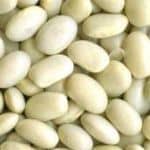 6 Canned Navy Beans
6 Canned Navy Beans| Leucine per Cup | Leucine per 100g | Leucine per 200 Calories |
|---|---|---|
| 1674mg (61% RDI) | 639mg (23% RDI) | 1131mg (41% RDI) |
More Beans and Lentils High in Leucine
- 51% RDI per cup of large white beans
- 49% RDI per cup of kidney beans
- 47% RDI per cup of lentils
See all beans and lentils high in leucine.
 7 Milk
7 Milk| Leucine per 16oz Glass | Leucine per 100g | Leucine per 200 Calories |
|---|---|---|
| 1563mg (57% RDI) | 319mg (12% RDI) | 1876mg (69% RDI) |
More Dairy High in Leucine
- 52% RDI per cup of yogurt
- 28% RDI per cup of low-fat buttermilk
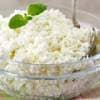 8 Low-Fat Ricotta Cheese
8 Low-Fat Ricotta Cheese| Leucine per 1/2 Cup | Leucine per 100g | Leucine per 200 Calories |
|---|---|---|
| 1531mg (56% RDI) | 1235mg (45% RDI) | 1790mg (66% RDI) |
More Cheese High in Leucine
- 43% RDI per 1/2 cup of low-fat cottage cheese
- 36% RDI per grated oz of parmesan
- 31% RDI per oz of Swiss cheese
- 27% RDI per oz of gouda
See all dairy foods high in leucine.
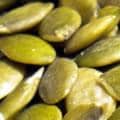 9 Squash and Pumpkin Seeds
9 Squash and Pumpkin Seeds| Leucine per 1oz Handful | Leucine per 100g | Leucine per 200 Calories |
|---|---|---|
| 678mg (25% RDI) | 2388mg (87% RDI) | 832mg (30% RDI) |
More Nuts and Seeds High in Leucine
- 17% RDI per oz of pistachios
- 16% RDI per oz of peanuts
- 15% RDI per oz of almonds
See all nuts and seeds high in leucine.
 10 Eggs
10 Eggs| Leucine in 1 Large Egg | Leucine per 100g | Leucine per 200 Calories |
|---|---|---|
| 538mg (20% RDI) | 1075mg (39% RDI) | 1387mg (51% RDI) |
Printable One Page Sheet
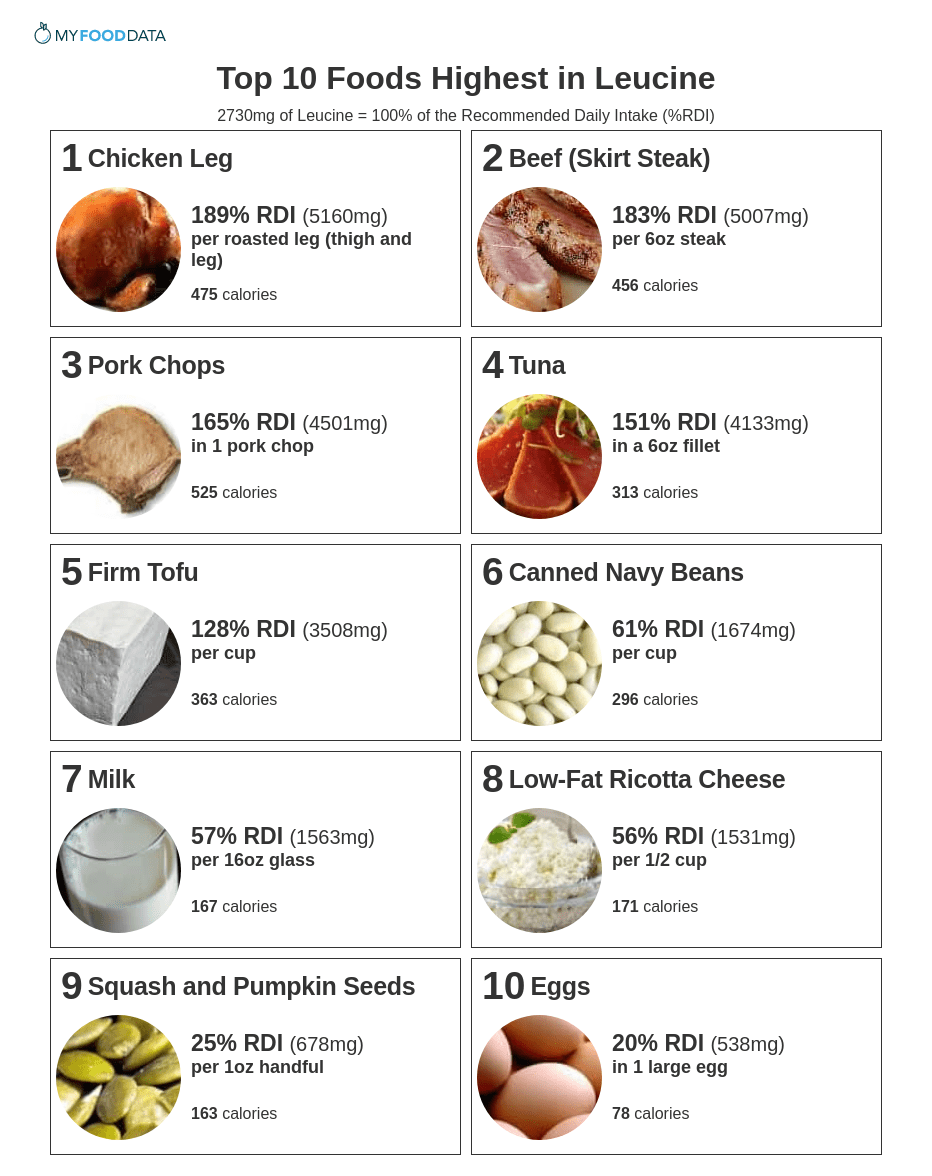
More Leucine Rich Foods
| Food | Serving | Leucine |
|---|---|---|
| 1 Processed Meats (Kielbasa Sausage) | per large link | 123% RDI (3356mg) |
| 2 Whelk (Cooked) | per 3oz | 119% RDI (3236mg) |
| 3 Cooked Eel | per 5.6oz fillet | 112% RDI (3056mg) |
| 4 Canned Sardines | 1 cup (drained) | 109% RDI (2981mg) |
| 5 Canned Shrimp | per cup | 79% RDI (2152mg) |
| 6 Soy Based Protein Powder | per 2oz scoop | 76% RDI (2071mg) |
| 7 Bacon | per 3 slices | 37% RDI (1013mg) |
| 8 Hemp Seeds | per oz | 23% RDI (614mg) |
| 9 Chia Seeds | per oz (~2 tblsp) | 14% RDI (389mg) |
| 10 Flax Seeds | per oz | 13% RDI (351mg) |
About the Data
Data for the curated food lists comes from the USDA Food Data Central Repository.
You can check our data against the USDA by clicking the (Source) link at the bottom of each food listing.
Note: When checking data please be sure the serving sizes are the same. In the rare case you find any difference, please contact us and we will fix it right away.
About Nutrient Targets
Setting targets can provide a guide to healthy eating.
Some of the most popular targets include:- Daily Value (%DV) - The daily value (%DV) is a general guideline for consumption that will prevent deficiency of a particular nutrient in most people. The %DV refers to the percentage of an amount that's found in a single serving of a food. It also accounts for absorption factors. It is set by the U.S. FDA.
- Recommended Dietary Allowance (%RDA) - The RDA sets an average daily dietary intake level that is sufficient to meet the nutrient requirements of nearly all (97.5%) healthy individuals. It's more specific than the daily value, and varies by age and gender. The RDA is set by the US National Instutites of Health.
- Reference Dietary Intake (%RDI) -The reference dietary intake is similar to the recommended daily allowance, but is specific to age and gender. The RDI for amino acids is set by the U.N. World Health Organization.
- Adequate Intake (%AI) - This value is primarily used in reference to omega-3 and omega-6 fats. The Adequate Intake is set by the U.S. Institute of Medicine. Because there is less evidence to determine the ideal targets for consumption of these nutrients, the specific amount is considered to be less reliable. Using the term Adequate Intake, rather than one of the other terms, helps to emphasize that the ideal intake of that particular nutrient has not yet been scientifically determined.
See the Guide to Recommended Daily Intakes for more information.
Want to set your own targets? Sign up for an account and set custom targets in the daily meal planner.From the Nutrient Ranking Tool
Use the ranking tool links below to select foods and create your own food list to share or print.
- Foods High in Leucine
- Foods Low in Leucine
- Vegetables High in Leucine
- Fruits High in Leucine
- Vegetarian Foods High in Leucine
- Nuts High in Leucine
- Grains High in Leucine
- Beans High in Leucine
- Dairy High in Leucine
- Breakfast Cereals High in Leucine
- Fast Foods High in Leucine
View more nutrients with the nutrient ranking tool, or see ratios with the nutrient ratio tool.
Related
Data Sources and References
Try the recipe nutrition calculator, or daily meal planner.
Create a free account to log and track foods.
